Home / News & Blog / Abrasive Blog / Understanding Silicon Carbide Abrasives: Colors, Types, and Applications in Metal Grinding
Yes, silicon carbide is a widely-used industrial abrasive known for its hardness, sharp edges, and durability. Its structure makes it suitable for grinding, cutting, and polishing hard materials, including metals, glass, and ceramics. Compared to other abrasives like aluminum oxide, silicon carbide offers a sharper cutting edge and greater thermal resistance, making it suitable for high-intensity grinding and finishing tasks.
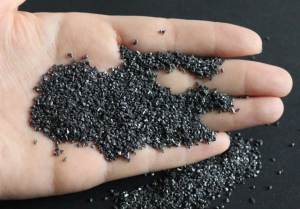
Comparisons with Other Abrasives
Silicon Carbide vs. Aluminum Oxide: Silicon carbide is sharper and more efficient for hard materials but wears faster than aluminum oxide in heavy grinding.
Silicon Carbide vs. Diamond: Diamond abrasives are harder but much more expensive, so silicon carbide is often preferred for applications where cost-effectiveness is a priority.
Silicon carbide (SiC) is a synthetic abrasive made by fusing silica sand and carbon at high temperatures. This process creates a highly durable, sharp material ideal for a wide range of abrasive applications, including grinding, cutting, and sandblasting. Silicon carbide’s hardness, thermal stability, and cost-effectiveness make it a preferred choice for abrasive tool manufacturers, especially those in the metalworking, glass, and ceramics industries. Its ability to retain sharp edges through wear makes it a powerful abrasive that’s efficient even in demanding applications.
Silicon carbide is one of the hardest synthetic abrasives available, rating approximately 9.5 on the Mohs hardness scale. Its strength makes it suitable for high-stress grinding tasks where long-lasting abrasives are necessary. This hardness allows it to tackle challenging materials like stainless steel, cast iron, and glass with efficiency, providing a durable solution for tasks requiring intense material removal.
Silicon carbide has excellent thermal stability, making it suitable for use at high temperatures. This stability means it can maintain its abrasive qualities even in heat-intensive processes, such as heavy-duty grinding, without losing its structure. This property makes it an ideal choice for applications where friction generates significant heat, as it can resist melting, warping, or degradation under pressure.
Silicon carbide is chemically inert and resists chemical breakdown, which helps it maintain quality and longevity over extended use. Its resistance to chemical reactions ensures that it can handle aggressive grinding tasks without significant wear, making it a reliable choice for long-term applications in various industrial environments.
One of silicon carbide’s most valuable qualities is its sharpness and self-sharpening ability. As the abrasive grains wear down, they reveal new, sharp edges that continue to cut effectively. This self-sharpening trait is particularly beneficial for precision applications, such as polishing and fine grinding, where maintaining consistent sharpness and control is essential.
Silicon carbide abrasives are available in two main colors: black and green. These colors signify differences in composition and usage:
Black Silicon Carbide: Created by fusing silica sand and petroleum coke, black silicon carbide contains iron impurities, giving it a distinctive dark color. This form is widely used for heavy-duty grinding and cutting applications due to its toughness.
![]()
![]()
Green Silicon Carbide: Produced from purer materials, green silicon carbide has a higher concentration of silicon carbide, making it sharper and harder than black silicon carbide. Green silicon carbide is mainly used in precision grinding and polishing applications, especially for materials like ceramics, glass, and tungsten.
Each color of silicon carbide has unique properties suited to different tasks, enabling manufacturers to select the best type based on their specific abrasive needs.
Silicon carbide grit is highly versatile and used in various applications across multiple industries. Common uses for silicon carbide grit include:
Abrasive Tool Production
Silicon carbide abrasives are integral to producing a wide range of abrasive tools, including grinding wheels, cutting tools, polishing stones, and coated abrasives. Below are some of the key applications in tool production:
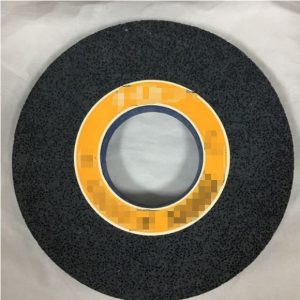
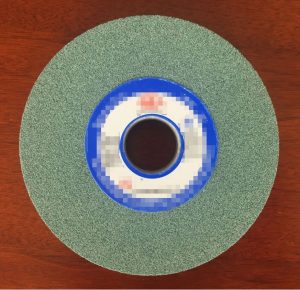
Silicon carbide’s hardness and heat resistance make it an excellent material for grinding wheels used in metal grinding applications. It is particularly effective on tough materials like stainless steel and cast iron, providing efficient material removal and a smooth surface finish. These wheels are used in metalworking for shaping and finishing metals and alloys.
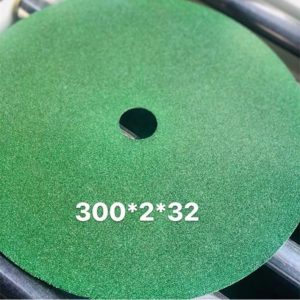
In cutting wheels, silicon carbide offers efficient material removal and durability, making it suitable for high-speed cutting applications. Its sharpness allows it to cut through metals and ceramics with ease, which is valuable in industries requiring precise cuts and minimal tool wear.
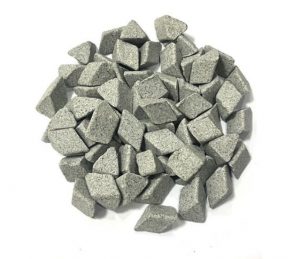
Silicon carbide’s ability to create smooth finishes makes it an ideal abrasive for polishing and honing stones. It is commonly used to achieve high-quality surfaces in metal and glass polishing applications, where a fine finish is critical. Its durability also makes it suitable for applications requiring consistent polishing performance.
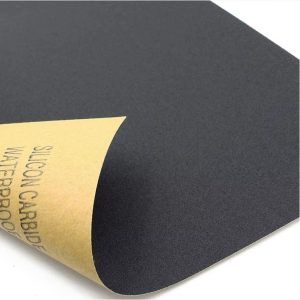
Silicon carbide is frequently used in sandpapers and other coated abrasives due to its sharpness and durability. It can be used on wood, metal, and glass surfaces, offering efficient material removal and a polished finish. Silicon carbide sandpaper is particularly popular in woodworking, metalworking, and glass etching for finishing tasks.
Metal Grinding and Surface Preparation
Silicon carbide abrasives are essential in various applications beyond tool production, particularly in metal grinding and surface preparation tasks where durability, precision, and heat resistance are critical.
In the metalworking industry, silicon carbide abrasives are widely used for heavy grinding tasks on materials like cast iron, non-ferrous metals, and certain alloys. Its toughness and sharpness make it ideal for high-stress grinding operations, providing efficient material removal without excessive wear.
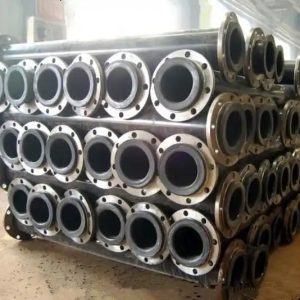
Silicon carbide abrasives play a vital role in surface preparation for processes like coating, painting, and finishing. Its sharp edges create an ideal surface profile for subsequent coatings, improving adhesion and durability. This application is common in industries where surfaces must be treated before protective or decorative finishes are applied, such as in construction, automotive, and marine sectors.
Industries such as aerospace and automotive, which require high levels of accuracy, rely on silicon carbide abrasives for precision grinding tasks. The self-sharpening ability of silicon carbide ensures that these abrasives provide consistent, sharp edges, making them suitable for tasks where accuracy and smoothness are critical. Precision grinding with silicon carbide is often used for intricate shapes and high-tolerance parts.
Silicon carbide is also valuable in the glass and ceramics industries for grinding and polishing hard, brittle materials. Its hardness and thermal stability allow it to handle the demands of grinding glass and ceramic materials, which require care to avoid cracking or warping. This abrasive is commonly used to produce smooth, clear finishes on glass and precise shapes in ceramics.
Its adaptability and sharpness make silicon carbide grit a staple in industrial applications that require efficient material removal.
While silicon carbide is effective on many materials, it is generally not recommended for softer metals like aluminum and copper. Its sharp, hard edges can be overly aggressive on these materials, causing excessive wear or even surface damage. For softer materials, a gentler abrasive like aluminum oxide may be more appropriate, as it provides a smoother finish without causing damage.
Additionally, for highly delicate materials or precision applications requiring minimal abrasive impact, softer abrasives may be better suited than silicon carbide.
Black silicon carbide is a highly durable, medium-hard abrasive with applications in heavy grinding and cutting. Due to its high thermal conductivity, it can withstand intense heat without losing its abrasive qualities, making it suitable for high-pressure environments.
Characteristics of Black Silicon Carbide
Hardness: Offers a balance of toughness and durability, suitable for grinding and cutting hard metals.
Applications: Black silicon carbide is often used in metal grinding wheels, sandblasting media, and cut-off wheels, particularly for heavy-duty tasks.
Its durability and moderate cost make black silicon carbide a popular choice for industries requiring abrasive efficiency in challenging conditions.
Green silicon carbide grinding wheels are prized for their high purity, sharpness, and hardness. These characteristics make them ideal for precision grinding and finishing applications on materials that require a fine surface finish, such as ceramics, glass, and tungsten carbide.
Applications for Green Silicon Carbide
Precision Grinding: Its sharp, crystalline structure allows for accurate material removal, making it valuable for producing smooth finishes.
Polishing Hard Materials: In the glass, ceramics, and electronics industries, green silicon carbide is commonly used in polishing wheels to achieve a mirror-like surface.
Due to its sharpness and purity, green silicon carbide is highly effective in applications where precision is critical.
Silicon carbide abrasives offer several advantages for manufacturers and buyers:
Cost-Effectiveness: Compared to other high-performance abrasives, silicon carbide provides durability and sharpness at a lower cost.
Versatility: With applications ranging from sandblasting and grinding to precision polishing, silicon carbide’s adaptability makes it valuable across industries.
Thermal Resistance and Hardness: Its ability to withstand high temperatures and maintain hardness under stress makes it ideal for heavy-duty grinding applications.
Eco-Friendliness: Many silicon carbide abrasives are recyclable, offering a more sustainable choice for industrial applications.
Silicon carbide is a powerful, cost-effective abrasive material that brings efficiency, durability, and versatility to a wide range of applications. From metal grinding to glass polishing, its properties make it suitable for various industrial uses, providing manufacturers and buyers with a reliable abrasive solution. By understanding its colors, types, and specific uses, manufacturers can leverage silicon carbide’s unique strengths to achieve high-quality finishes in abrasive tool production and beyond.